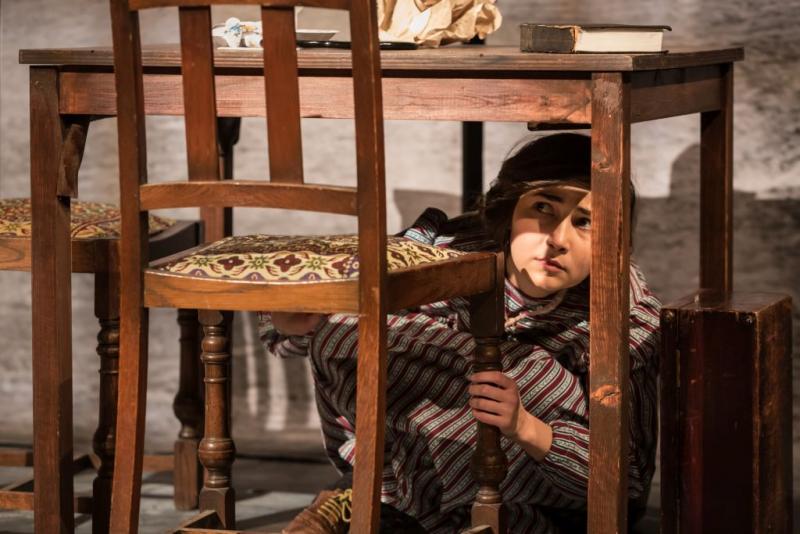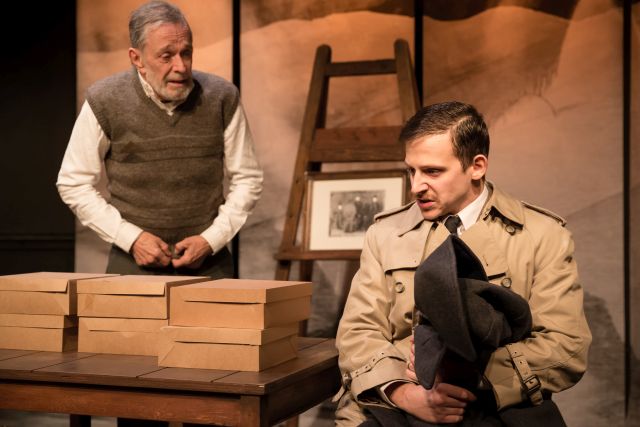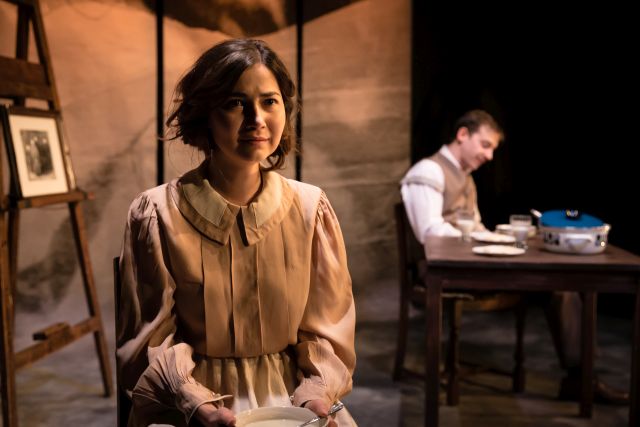Beast on the Moon, Finborough Theatre review - drama of familial displacement packs a quiet punch | reviews, news & interviews
Beast on the Moon, Finborough Theatre review - drama of familial displacement packs a quiet punch
Beast on the Moon, Finborough Theatre review - drama of familial displacement packs a quiet punch
American play from mid-'90s resonates afresh today

In the history of early photography in the Middle East, it was the Armenian Christian traders and their descendents who became the pioneers of the new technology.
Aram, in the American writer Richard Kalinoski's 1995 play Beast on the Moon, newly revived at the Finborough, is one of these Armenian pioneers. His father was the village photographer back home in Turkey; now, Aram plies his trade in Milwaukee, Wisconsin, with increasing success, a camera always to hand. It is 1921 and the fate of his family, both in the pogroms and the massacres in which an estimated 1.5 million people died, is told via the faces cut out of the photograph on the wall. This young newcomer to a new land shows all the symptoms of post-traumatic stress disorder. Jelena Budimir's deft production reveals a lovely sepia-tinted set from Sarah Jane Booth giving unto a play that has collected a pocketful of awards and been translated into 20 languages. In some ways, this is old-fashioned playwriting: the story of a marriage in two acts, with questions to be answered and conflicts to be resolved, a blissful clarity of narrative and a beginning, middle, and end. We're dealing with newlyweds in the shadow of savage trauma whose eyes have seen terrible things and who have set out to rebuild, all of which begs the question: can they make it through?
Jelena Budimir's deft production reveals a lovely sepia-tinted set from Sarah Jane Booth giving unto a play that has collected a pocketful of awards and been translated into 20 languages. In some ways, this is old-fashioned playwriting: the story of a marriage in two acts, with questions to be answered and conflicts to be resolved, a blissful clarity of narrative and a beginning, middle, and end. We're dealing with newlyweds in the shadow of savage trauma whose eyes have seen terrible things and who have set out to rebuild, all of which begs the question: can they make it through?
As the play opens, Aram (George Jovanovic, with Hayward B Morse, pictured above) is receiving his child bride Seta (Zarima McDermott) who, like Aram, is Armenian but from Istanbul and has been chosen from photographs of other single survivors. Seta is 15 with the manner of a childish simpleton, but possessed of a wisdom that grows and matures throughout the play: Aram wants her not to hold dolls and to be a woman, and he reads to her hand-picked passages from the Bible in a fierce yet comic desperation to be the young father of the household.
 Both Aram and Seta lost their entire families in what is called the Armenian genocide, a term fiercely disputed by Turkey to this day and not as yet recognised by the British or Israeli governments. Their orphaned existence gives the play its horrid universality. Aram and Seta could be Jewish or indeed, today, Syrian and probably tomorrow Yemeni. The Turks bear the brunt of it within Kalinoski's play: when Seta says she has seen a Turk in her angry husband's face, a look of horror comes over him as he realises that he has become an oppressor.
Both Aram and Seta lost their entire families in what is called the Armenian genocide, a term fiercely disputed by Turkey to this day and not as yet recognised by the British or Israeli governments. Their orphaned existence gives the play its horrid universality. Aram and Seta could be Jewish or indeed, today, Syrian and probably tomorrow Yemeni. The Turks bear the brunt of it within Kalinoski's play: when Seta says she has seen a Turk in her angry husband's face, a look of horror comes over him as he realises that he has become an oppressor.
Hayward B Morse provides an excellent anchor as the elderly narrator and amuses as a 12-year-old orphan boy. Jovanovic (with McDermott pictured above) plays the young man desperate to remake what was lost while struggling to find a way to question himself and come out from under his own anger. McDermott moves persuasively from naive émigrée to a burgeoning American Midwesterner who is the one finally to show her husband the way. For all the offstage horror, Beast on the Moon comes laced with charm: a touching and eminently watchable drama.
- Beast on the Moon at the Finborough Theatre until 23 February
- Read more theatre reviews on theartsdesk
Add comment
The future of Arts Journalism
You can stop theartsdesk.com closing!
We urgently need financing to survive. Our fundraising drive has thus far raised £49,000 but we need to reach £100,000 or we will be forced to close. Please contribute here: https://gofund.me/c3f6033d
And if you can forward this information to anyone who might assist, we’d be grateful.

Subscribe to theartsdesk.com
Thank you for continuing to read our work on theartsdesk.com. For unlimited access to every article in its entirety, including our archive of more than 15,000 pieces, we're asking for £5 per month or £40 per year. We feel it's a very good deal, and hope you do too.
To take a subscription now simply click here.
And if you're looking for that extra gift for a friend or family member, why not treat them to a theartsdesk.com gift subscription?
more Theatre
 Not Your Superwoman, Bush Theatre review - powerful tribute to the plight and perseverance of Black women
Golda Rosheuvel and Letitia Wright excel in a super new play
Not Your Superwoman, Bush Theatre review - powerful tribute to the plight and perseverance of Black women
Golda Rosheuvel and Letitia Wright excel in a super new play
 Cow | Deer, Royal Court review - paradox-rich account of non-human life
Experimental work about nature led by Katie Mitchell is both extraordinary and banal
Cow | Deer, Royal Court review - paradox-rich account of non-human life
Experimental work about nature led by Katie Mitchell is both extraordinary and banal
 Deaf Republic, Royal Court review - beautiful images, shame about the words
Staging of Ukrainian-American Ilya Kaminsky’s anti-war poems is too meta-theatrical
Deaf Republic, Royal Court review - beautiful images, shame about the words
Staging of Ukrainian-American Ilya Kaminsky’s anti-war poems is too meta-theatrical
 Laura Benanti: Nobody Cares, Underbelly Boulevard Soho review - Tony winner makes charming, cheeky London debut
Broadway's acclaimed Cinderella, Louise, and Amalia reaches Soho for a welcome one-night stand
Laura Benanti: Nobody Cares, Underbelly Boulevard Soho review - Tony winner makes charming, cheeky London debut
Broadway's acclaimed Cinderella, Louise, and Amalia reaches Soho for a welcome one-night stand
 The Pitchfork Disney, King's Head Theatre review - blazing with dark energy
Thrilling revival of Philip Ridley’s cult classic confirms its legendary status
The Pitchfork Disney, King's Head Theatre review - blazing with dark energy
Thrilling revival of Philip Ridley’s cult classic confirms its legendary status
 Born with Teeth, Wyndham's Theatre review - electric sparring match between Shakespeare and Marlowe
Rival Elizabethan playwrights in an up-to-the-minute encounter
Born with Teeth, Wyndham's Theatre review - electric sparring match between Shakespeare and Marlowe
Rival Elizabethan playwrights in an up-to-the-minute encounter
 Interview, Riverside Studios review - old media vs new in sparky scrap between generations
Robert Sean Leonard and Paten Hughes make worthy sparring partners
Interview, Riverside Studios review - old media vs new in sparky scrap between generations
Robert Sean Leonard and Paten Hughes make worthy sparring partners
 Fat Ham, RSC, Stratford review - it's Hamlet Jim, but not as we know it
An entertaining, positive and contemporary blast!
Fat Ham, RSC, Stratford review - it's Hamlet Jim, but not as we know it
An entertaining, positive and contemporary blast!
 Juniper Blood, Donmar Warehouse review - where ideas and ideals rule the roost
Mike Bartlett’s new state-of-the-agricultural-nation play is beautifully performed
Juniper Blood, Donmar Warehouse review - where ideas and ideals rule the roost
Mike Bartlett’s new state-of-the-agricultural-nation play is beautifully performed
 The Gathered Leaves, Park Theatre review - dated script lifted by nuanced characterisation
The actors skilfully evoke the claustrophobia of family members trying to fake togetherness
The Gathered Leaves, Park Theatre review - dated script lifted by nuanced characterisation
The actors skilfully evoke the claustrophobia of family members trying to fake togetherness
 As You Like It: A Radical Retelling, Edinburgh International Festival 2025 review - breathtakingly audacious, deeply shocking
A cunning ruse leaves audiences facing their own privilege and complicity in Cliff Cardinal's bold theatrical creation
As You Like It: A Radical Retelling, Edinburgh International Festival 2025 review - breathtakingly audacious, deeply shocking
A cunning ruse leaves audiences facing their own privilege and complicity in Cliff Cardinal's bold theatrical creation
 Edinburgh Fringe 2025 reviews: Refuse / Terry's / Sugar
A Ukrainian bin man, an unseen used car dealer and every daddy's dream twink in three contrasting Fringe shows
Edinburgh Fringe 2025 reviews: Refuse / Terry's / Sugar
A Ukrainian bin man, an unseen used car dealer and every daddy's dream twink in three contrasting Fringe shows

Comments
Many thanks for your